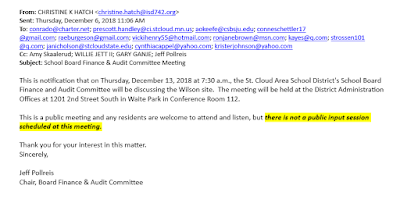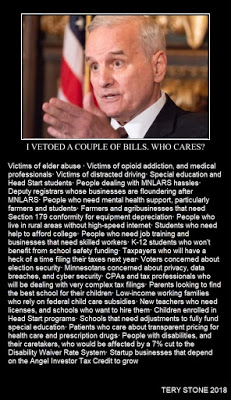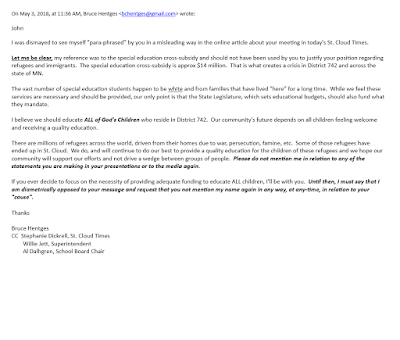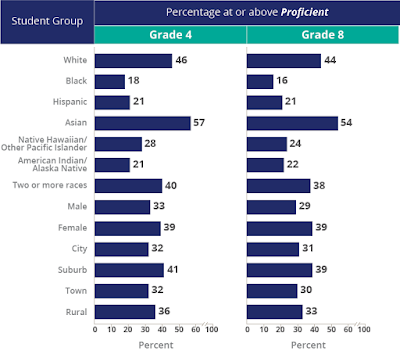Archive for the ‘Education’ Category
At a time when there’s major distrust of institutions of government, you’d think that government closest to the people would hold themselves to a higher level of listening to their constituents. That certainly isn’t what’s happening at the ISD742 monthly meetings.
A loyal reader of LFR sent me an email highlighting the fact that the school board welcomes people to their meetings but doesn’t want the public’s input. Contained in the email is a sentence that says “This is a public meeting and any residents are welcome to attend and listen, but there is not a public input session scheduled at this meeting.”
BTW, here’s the email:
I’m not a constitutional law professor but I can’t see how this isn’t a violation of the First Amendment. This judge’s ruling seems to strengthen that belief:
A section of a Virginia school board’s bylaws violates the First Amendment and results in stifled speech, according to a ruling by a federal district judge on April 27. U.S. District Court Judge Henry C. Morgan Jr. held that the Virginia Beach School Board’s rule banning personal “attacks or accusations” during public comment periods at board meetings was a form of prior restraint.
The ruling stemmed from a lawsuit filed last July by David and Nicole Bach, who are parents in the school district. The Bachs claimed that school district officials enacted the provision in retaliation for the Bachs’ criticism of the district’s gifted education program. After the school board imposed the restriction, the Bachs argued that the bylaw stifled their free speech rights. The judge ordered the school board to strike the contested provision from the bylaw, but also allowed the other rules for the public comment portion of meetings to remain.
This is directly on point. Most importantly, it’s an attempt to stifle speech that the school board doesn’t want to hear.
That’s tough. If these politicians don’t want to hear from their constituents, they should resign. If they can’t stand the heat, they shouldn’t be in the kitchen.
The next time that the St. Cloud School Board meets, citizens should insist on giving input. If the board doesn’t permit it, the citizens should notify the school board that they’re filing a lawsuit in federal court claiming that their practices violate their First Amendment rights.
Citizens shouldn’t be stifled by the ruling class. It’s clear that they don’t see themselves as public servants. How sad is that?
According to this article, the Center for the American Experiment is ruffling a few feathers with its recent report on Minnesota’s economy. Economist John Phelan, the author of the report, wrote that “The state’s economy is growing, but it’s growing below the national average.”
Later in the article, it says “Phelan cited data that has become popular with conservative economists: gross domestic product per worker. By that measure, Minnesota ranks 28th among the 50 states and Washington, D.C., and is well below the national average. It’s in stark contrast to the figures cited by economists, including gross domestic product per capita. By that measure, Minnesota is indeed above the national average and ranked 15th. The difference is that per capita measures the state’s economy against its entire population, while per worker measures it against only those who are employed.”
Economists can argue which is the better way of measuring economic growth. The only thing that people care about are whether lots of good-paying jobs are getting created. They aren’t. If the economy was creating lots of good-paying jobs, there wouldn’t need to be a push for a $15/hr. minimum wage because the economy would be creating lots of jobs that pay more than that.
Further, companies and people are moving out of Minnesota for places like North Carolina, Georgia, Texas and other states because Minnesota’s business climate sucks. The DFL argues that we just need a well-trained work force. I don’t disagree that we need skilled workers but I’ll vehemently disagree that that’s all we need. I was stunned to hear during the campaign that Minnesota’s lowest income tax bracket was higher than the top bracket in 20+ states.
That’s before we talk about Minnesota’s regulatory regime. Saying that it’s stifling is understatement. It’s designed to prevent competition and prevent economic growth. Most of it is built to appease the environmental activists and encourage lawsuits.
Given the high taxes and punishing regulations, why would anyone build or expand their business in Minnesota? They’d have to be masochistic.
According to this AP article, the DFL’s investigation (I use that term loosely) into Keith Ellison’s alleged domestic abuse is drawing to a close. What that investigation will find is anyone’s guess.
According to the article, “The longtime Minnesota congressman and Democratic National Committee deputy chairman has called the allegations false and tried to ride out the storm of questions after winning the Aug. 14 primary. But the old sexual assault allegations that have thrown Brett Kavanaugh’s Supreme Court nomination in doubt have renewed focus on Ellison and a six-week old investigation into his conduct that has shown few outward signs of progress.”
Ken Martin, the chairman of the Minnesota DFL (Democratic-Farmer-Labor) party is getting frustrated:
Minnesota Democratic-Farmer-Labor Party Chairman Ken Martin said he believes the investigation has concluded and that a final report should be issued in the coming days. “I’m starting to get a little frustrated because it’s been a long time now, almost two months,” he said. “I hope soon. I hope any day here.”
That won’t happen after Karen Monahan’s Twitter rampage last night:
Example of a misogynistic narcissist conversation.
Keep reading tweets after this to get the full convo. pic.twitter.com/IKvGgTXfvF— Karen Monahan (@KarenMonahan01) November 25, 2017
That’s just one of her tweets. Here’s another:
April 2018 pic.twitter.com/7ucO8GwD6z— Karen Monahan (@KarenMonahan01) August 12, 2018
Then there’s this:
2nd
April 2018 pic.twitter.com/sNSvccEUON— Karen Monahan (@KarenMonahan01) August 12, 2018
Based on this new information, I’m skeptical that the investigation is finished. I suspect this is just getting restarted. If these types of tweets keep coming out, the DFL won’t have a choice but to throw Ellison under the #MeToo bus.
I first wrote about Dan Wolgamott’s LTE in this post. I noted at the time that Wolgamott whined that “our current elected officials aren’t making our kids a priority. We’ve seen the same story play out too many times in our schools: budget deficits that lead to increased class sizes, fewer opportunities for our kids than we had, and when budget deficits get too large, a referendum for a higher local levy. Lily and all of her classmates deserve an outstanding education and a chance to succeed! If we want Minnesota to continue to be a leader, we have to do better, and the Republican-led Legislature needs to step up and adequately fund our schools.”
The problem with that statement is that it’s rubbish. It was a prediction based on Wolgamott’s partisan bias. The truth is that Republicans stepped up and funded education. The bill they passed and sent to Gov. Dayton’s desk would’ve spent $90,000,000 more than Gov. Dayton requested.
The problem? In another of Gov. Dayton’s infamous temper tantrums, Gov. Dayton vetoed the bill. In his LTE, Wolgamott said that if “we want Minnesota to continue to be a leader, we have to do better, and the Republican-led Legislature needs to step up and adequately fund our schools.” Actually, what’s needed is to elect a Republican as governor and never let another spoiled brat DFL politician in as governor. Gov. Dayton was a 2-term failure. He fought with the DFL Senate Leader in 2014. He shut down government in 2011 because he didn’t get everything he wanted. That sounds familiar:
In 2015, Speaker Daudt and Sen. Bakk tried negotiating a bipartisan budget bill. After a week of negotiating, they still hadn’t reached an agreement with Gov. Dayton so they decided to negotiate between themselves. An hour later, they’d reached an agreement. Once again, Gov. Dayton was the impediment.
During his watch, Gov. Dayton watched the MNLARS project fail repeatedly. Further, Gov. Dayton didn’t catch the child care fraud even though a whistleblower told them about it in 2014. Finally, Gov. Dayton didn’t notice the elder abuse scandal. That didn’t get his attention until Republican Sen. Karin Housley started investigating.
In summation, Wolgamott is a blowhard. He accused Republicans of not stepping up for ‘the children’, only to watch Gov. Dayton not step up for the children. We don’t need partisans like Wolgamott in the legislature. We need solutions-oriented men like Jim Knoblach in there. Chairman Knoblach has a history of putting solid, bipartisan budgets together.
Doug Schoen’s op-ed in the Hill explains why Democrats just can’t win for losing. In his op-ed, Schoen wrote “Despite this, the Republicans steadily made ground in the six months leading up to the 1994 midterm elections, all the while promoting their set of alternative policies, famously titled the ‘Contract with America,’ and eventually winning the actual vote by 7 points nationally. Thus, while the minority party would suffer setbacks and trail in the generic ballot from time to time, a persuasive plan for governing, focused on detailed and moderate policy ideas, compelled voters to flip the House by a landslide.”
After Trump’s victory, the Democrats were so upset that they started “The Resistance.” The end result of the Resistance is the Democrats’ inability to agree with President Trump on anything. When President Trump says that the sun rises in the east, Democrats feel compelled to say something like ‘Trump isn’t an expert. He should consult with a scientist.’ The point is that sometimes they’ll just say he’s wrong, sometimes they’ll just question him.
At no time have they offered fresh ideas.
Next, Schoen highlighted the Republicans’ strategy in 2010:
Once again, it is important to point out that the Republicans were only as successful as they were in 2010, flipping 63 seats, because they presented a compelling and effective alternative to Nancy Pelosi and the Democratic leadership at that time. The Republicans clearly articulated to voters what they intended to accomplish.
Instead of offering fresh ideas, Democrats are left to this pandering:
Teacher pay might or might not be enough. What’s certain is that the ratio of administrators to teachers keeps increasing. At the rate that ratio keeps increasing, administrators will outnumber faculty within the next few years. With so many federal regulations in place, the administrators are required to administer each program.
If Democrats wanted to raise teacher pay and provide better learning experiences, they’d offer reforms rather than pander to the special interests. If Democrats broke free of these special interests, they might actually offer a compelling solution, which would help them win voters’ trust. Because they won’t (and haven’t) done that, everyone loses.
The reason why tax cuts are popular is because people are tired of feeling like ATMs. Each week, people feel like the Democrats’ special interest groups have thought of another way to spend our money. The people have noticed that the Democrats’ special interest groups haven’t thought of ways to save money or make things better.
The GOP has its faults but it’ll never be accused of not coming up with fresh ideas. That’s why Republicans are well-positioned to buck history this year.
UPDATE: Jeff at LidBlog has a great post on the disappearing blue wave that’s today’s must-read. Jeff’s advice is the right advice at the moment:
While the political news is good for the GOP, now is the time for us to be increasing our efforts at turning out conservative voters and making sure our message of personal and economic freedom is getting out to the average, middle-of-the-road voter. Encourage your fellow conservatives to be more active in their work, and to be reminding their friends and families about the importance of staying involved and voting for suitable candidates. Let’s not allow the Democrats to slow down our string of economic, political, and foreign policy victories… get out there and make sure that Republicans hold on to the House and maybe even grow their lead in the Senate!
I have 1 slight quibble with Jeff. If GOP activists do their job, we’ll definitely expand the GOP majority in the Senate. Finally, it’s worth noting that the RNC has invested a ton of $$$ in GOTV infrastructure. It isn’t the sexiest topic with journalists — until it produces great results.
While reading through this MPR article, I discovered a provocative insight into Gov. Dayton’s thinking. Specifically, I’m talking about when he said “Divided government has not worked well for Minnesota over the last eight years but it has worked better than it did this time.”
This puts the final piece of the puzzle in place to figuring out (to the best that’s possible) Gov. Dayton’s thinking and attitude. Consider these things:
- In 3 of the 4 budget years, Gov. Dayton either shut government down or pushed things to a special session.
- In 2015, Sen. Bakk and Speaker Daudt spent an entire week negotiating with Gov. Dayton on a budget agreement without success. After their Friday meeting with Gov. Dayton, they took it upon themselves to fashion a bipartisan budget agreement. An hour later, they’d reached agreement.
- This year, Gov. Dayton vetoed a standalone bill because it wasn’t part of a bigger bill.
- Gov. Dayton vetoed other bills because they were too big.
- Gov. Dayton vetoed a spending bill, saying it didn’t have new money in it even though it had new money in it.
These aren’t the actions of a rational man. They’re either the actions of a man that’s falling apart or the actions of a man who’s playing political games with people’s lives.
It’s impossible to deal with irrational people like this. It’s like trying to predict the flight pattern of butterflies. It’s just simply impossible. These are the people who will get hurt thanks to Gov. Dayton’s irrational vetoes:
Gov. Dayton accused Republicans of putting together bad bills for their campaigns. Sen. Gazelka quickly shot that accusation down:
“Everywhere we turn, somebody is impacted, because in the end we are too stubborn to give in,” said Gazelka, R-Nisswa. It’s unfair, he added, to say Republicans are only interested in their campaigns for re-election, particularly in the Senate, where members are not on the ballot this year. “It feels impulsive, it feels vindictive and it didn’t help anybody in Minnesota,” he said of the vetoes. “I don’t know where we go from here.”
Gov. Dayton made that accusation to put the blame anywhere except on him. Like Gov. Dayton, the accusation is the product of Gov. Dayton’s impulses and his dishonesty.
The budget bill would have used money from the state surplus to help boost school security, take steps to attack the opioid epidemic, begin addressing problems with the elder care system and more. The tax bill authorized $225 million in spending for schools meant to avert layoffs and program cuts in some districts, but Dayton had called it “fake,” because only $50 million of it was new money.
What a blithering idiot. I’m betting those parents and students don’t care whether the money is new or tapped from reserves. They care whether they’ll be safe next fall.
This is another situation where Gov. Dayton insisted on something, then vetoed the legislation whether it took care of the people’s needs. If it met the people’s needs but not his demandments, it got vetoed. Wasn’t the biggest requirement of the job to make the people’s lives better? I don’t recall it being that important to make the politicians happy.
We haven’t gotten to the campaign yet and I’m already tired of his whining. In this LTE, Wolgamott essentially whines about the tough job of governing, saying “But unfortunately, our current elected officials aren’t making our kids a priority. We’ve seen the same story play out too many times in our schools: budget deficits that lead to increased class sizes, fewer opportunities for our kids than we had, and when budget deficits get too large, a referendum for a higher local levy. Lily and all of her classmates deserve an outstanding education and a chance to succeed! If we want Minnesota to continue to be a leader, we have to do better, and the Republican-led Legislature needs to step up and adequately fund our schools.”
First, the only thing that Minnesota is a leader in is having people leave the state for other destinations. The state demographer verifies that. So does the IRS. Next, liberal-infested school boards are to blame for this manufactured crisis. We’re told that 59 school districts are running deficits. Then we’re told that 10 percent per biennium spending increases aren’t enough. When’s the last time you got a 10% increase in your wage over 2 years and it wasn’t enough? Third, Mr. Wolgamott, what’s your definition of ‘adequately funding our schools’? Is there a definition? I suspect there isn’t.
But even with a budget surplus, Republicans in the legislature, including Rep. Jim Knoblach, are refusing to support the Emergency School Aid proposal. Some even questioned whether there is an emergency or need for the funding. Politicians are continuing to shortchange our schools just to put corporations and the wealthy first. That’s just not right, and it’s not fair to our children.
I’m tired of the DFL’s lying about Republicans shortchanging kids so they can “put corporations and the wealthy first.” It’s an outright lie. First, Republicans are willing to work with Gov. Dayton on addressing the needs of the 59 districts. They just aren’t willing to add 2% to the K-12 spending formula, which helps schools running surpluses and those running deficits. Instead, Gov. Dayton is insisting on his way only. That isn’t negotiating. That’s what autocrats do.
Next, it’s worth noting that Mr. Wolgamott intentionally omitted the part about a GOP counteroffer. Why? It’s impossible to climb inside a mind like Wolgamott’s but I suspect it’s because he wants to create the impression that Republicans simply don’t care about education. Anyone that works that hard at creating the impression that Republicans don’t care isn’t the type of guy that’d bring people together. I don’t have to question whether Jim Knoblach can bring people together. I’ve seen him do it. I must question Wolgamott on bringing people together because all I’ve got to go on is his claim that he’ll bring people together. That isn’t much to go on with someone as deceptive as he is.
Ensuring all of our children have access to a great education is critical for the future of our state. It’s the key to good jobs and a great economy, and making sure our kids can live a better life than their parents. It’s time for leaders from both parties to work together and pass this Emergency School Aid. And if they won’t, let’s replace them with people who will put our kids first.
What Mr. Wolgamott didn’t say in that paragraph is that Minnesota also needs competitive tax rates and fewer regulations to create jobs and a bright future. Apparently, Wolgamott hasn’t figured it out that people from each age group and each income group are leaving Minnesota because Minnesota just isn’t the desirable state to live in anymore thanks to the DFL’s policies.
We’ve had divided government, in which case the DFL won the budget fight. We’ve had unified DFL government, which resulted in the DFL winning the budget fight. What we haven’t had is unified Republican government. What we know is that Gov. Dayton and the Metrocrats have spent tons of money on Twin Cities things while ignoring rural Minnesota. That’s why voters threw out DFL legislators and gave the legislative keys to Republicans.
That’s pretty astonishing considering the fact that Gov. Dayton repeatedly told voters that he wanted DFL majorities in the House and Senate in 2017. Instead, voters gave him Republican majorities in the House and Senate in 2017. They know the Dayton plan isn’t working. What’s most needed is competence, something that’s been lacking in the governor’s mansion the past 8 years. Think MNLARS, MNsure, the nursing home crisis and the child care fraud scandal.
It’s safe to say that Bruce Hentges’ attempt to bully John Palmer backfired. In the interest of full disclosure, Dr. Palmer has been a friend of mine for quite some time, meaning I’m quite biased. Nonetheless, I’m confident that I can make a compelling case proving my opening statement.
This got started when Mr. Hentges sent this email to Dr. Palmer, Willie Jett, Al Dahlgren and Stephanie Dickrell. Jett is the superintendent of schools in ISD 742. Mr. Dahlgren is the chairman of the ISD 742 School Board. Ms. Dickrell is a reporter for the St. Cloud Times. Ms. Dickrell covers the education beat in St. Cloud.
(Click to enlarge.)
The final paragraph is where Mr. Hentges gets himself in trouble. That’s where he said “If you ever decide to focus on the necessity of providing adequate funding to educate ALL children, I’ll be with you. Until then, I must say that I am diametrically opposed to your message and request that you not mention my name again in any way, at any-time, in relation to your ’cause’.”
Here’s how Dr. Palmer responded:
The key paragraph in Dr. Palmer’s email comes when he said “I am glad you believe we should educate “All of God’s Children who reside in the district. Does that mean you support vouchers and charter schools? These children who attend charter and private schools also reside in the district and family wealth should not restrict school access to the best education for each individual student. Children have diverse needs and need diverse options.”
Of course, Mr. Hentges doesn’t support giving parents additional options. He’s long believed that the money should go to the school, not the student. Finally, Dr. Palmer said “Finally, after your and the full school boards silencing me last Thursday night, it is simply outrageous that you are trying to restrict my First Amendment rights. I will continue to do the right things for the right reasons and use my research and scholarship talents to shed light on important topics in a fair and unbiased basis.”
It isn’t coincidence that Hentges cc’ed the Times education beat reporter on this email. The School Board hasn’t tried to be accountable in recent years. The Times called them out for not holding enough listening sessions after the initial bonding referendum was defeated.
The incident Dr. Palmer is talking about happened when he tried to speak at the last School Board meeting. He was invited to the meeting to talk about the Minnesota Department of Human Rights, aka MDHR.. At the actual meeting, though, they didn’t invite Dr. Palmer to speak.
The School Board and the City Council have become deaf to anyone who isn’t part of their clique. They represent the people. They represent the special interests. Thankfully, Dr. Palmer is highlighting their excesses.
Technorati: Bruce Hentges, ISD 742, Bullying, School Board, City Council, Al Dahlgren, Willie Jett, John Palmer, Accountability, Transparency
In April, 2013, then-Speaker Paul Thissen issued this statement bragging about their “historic investment in education.” Back then, Thissen wrote “We’re making 2013 the ‘education session’ because we know that a world-class education system is the gateway to a world-class economy. The House DFL budget keeps our promise to Minnesotans by paying back the $850 million owed to our schools while investing in our future and putting our kids on the path to the world’s best workforce.”
That’s when the DFL was strutting, telling whoever would listen that they’d finally straightened out Minnesota’s budget, which they blamed on Minnesota Republicans. A year after that, I wrote this post about the St. Cloud School Board and the Princeton School Board raising property taxes. In Thissen’s statement in 2013, he predicted that the DFL’s “education budget’ would ‘reduce property taxes.'”
Apparently, math wasn’t Thissen’s specialty:
St. Cloud school district has imposed its largest tax levy increase in six years for 2015. The district’s property-tax levy will increase by $3.3 million, or 14.75 percent, to nearly $26 million. The school board voted unanimously Thursday night to approve the 2015 levy. District officials say the increase is needed to pay for a spate of improvements to facilities.
That property tax increase was preceded by Princeton’s property tax increase:
The Princeton School Board, in a split vote on Dec. 16, increased the school district tax levy by 25.16 percent for taxes payable 2015 to fund the 2015-16 school year. This was a departure from the board’s originally proposed 33.87 percent hike. The total levy will be a little more than $6.091 million, a $300,000 increase over this year’s levy. The original proposal would have increased the levy $724,000.
You’re likely wondering where I’m going with this. Here’s where I’m heading with this:
Gov. Mark Dayton is calling for $138 million in emergency funding for Minnesota schools as districts across the state grapple with budget shortfalls. Dayton unveiled his request to lawmakers Tuesday as the Legislature heads toward a mandatory May 22 adjournment. The Democratic governor’s proposal would increase the state’s per-pupil funding formula by 2 percent.
How is this possible? The DFL told us that they’d made an historic investment in education. Less than a year later, people were getting hit with gigantic property tax hits. Question: how historic could the investment be if it disappeared less than a year later?
Gov. Mark Dayton is calling for an emergency $138 million one-time funding package for every MN school district. It amounts to $126 per student. He says it’s a response to 59 school districts facing budget shortfalls and possible teacher layoffs. pic.twitter.com/unkQbpmBtn— Tom Hauser (@thauserkstp) May 1, 2018
Let’s be blunt. The DFL’s ‘investment’ did nothing except encourage school districts to spend like drunken sailors. The lesson to be learned from this is that raising taxes and spending only leads to increased taxes and increased reckless spending.
Follow the money—again!!
Written by Rambling Rose
According to the National Center for Education Statistics, the investment (current years/dollars as reported) in K-12 education with state and federal tax dollars:
Total expenditures for public elementary and secondary schools in the United States in 2013–14 amounted to $634 billion, or $12,509 per public school student enrolled in the fall (in constant 2015–16 dollars).
One would expect good returns on such investments, but the 2017 National Assessment of Educational Progress (NAEP), known as The Nation’s Report Card, released earlier in April, gives the nation’s schools a failing grade. Only 37% of the high school seniors tested as proficient or better in reading, and only 25% in math. Among the black students, the results were even lower: 17% proficient or better in reading, 7% ‘at least proficient’ in math.
It gets worse. Nationally, the graduation rate is over 80%. That means that the high school diploma has lost its meaning. With the high school diploma in hand, 63% of the graduates are declared proficient in reading at the 12th grade level when the test scores reveal the opposite. Likewise, 75% of high school graduates are deemed proficient in math skills when they are not. For black students, the numbers are even lower as noted by the test scores in the previous paragraph.
What does that diploma certify? Attendance? Are those young people ready to continue their postsecondary education?
Apparently. The Bureau of Labor Statistics reported that “70 percent of white high school graduates in 2016 enrolled in college, and 58 percent of black high school graduates enrolled in college.” Studies report that two-thirds of community college students enroll in at least one remedial course as do 40% of those in a four-year institution. Many universities hire special tutors to assist their athletes, many who read at the fourth- to eighth-grade levels.
College professors admit that they have had to “dumb down their classes” in order to teach their inadequately-prepared students. Others have removed the analytical components of the programs. Majors have become “studies” with the emphasis on social issues. Sadly, the cycle continues. Many of the least prepared enter education, as revealed by their intended majors reported by SAT scores—26th of 38 options.
The executive director of the Council of Chief State School Officers, the organization that represents every state’s top education official, Carissa Moffat Miller, stated “Today’s release of The Nation’s Report Card confirms that there is still much work to be done to close achievement gaps and ensure that our young people are ready for success in college, careers and life.”
Yes, there is much work to be done—by teachers, administrators, politicians, students and PARENTS. Parental involvement and schools with a focus on academics and not ‘justice’ issues would be a start.
It appears that dollars alone are not the answer.






